Bee removers
Lees gerus hierdie bladsy in Afrikaans
As a bee removing company, we take pride in the service that we offer our clients. Bee removers are in high demand, because they offer a unique service, that really helps and protects people. We make sure to completely remove the bees from the premises. The area is left safe and free of bees. Our services are needed in many areas of the country, in homes and offices and in shopping malls. We offer a service that provides:
- Peace of mind
- Safety
- Freedom to move around
if one can have this in their life, then one can be happy. That is our job, to make our clients happy.
Bee safety
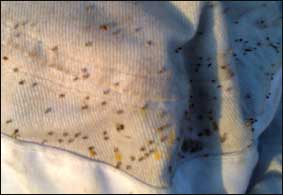 Most
people do not know that they are allergic
to bees up until they get stung. By then it is too late. Some bee
stings can be lethal, depending on the individual who has been stung.
That is why bee removers
are important. They minimise the chances of being stung
by a bee, or bees in your home. Though they provide us with
honey, bees can be dangerous, but only when provoked. They are as scared
of you, as you are them. We as bee
removers, try remove bees
without hurting them. In some cases, some bees do get hurt and die.
But we make sure to find the safest way to remove them. Most
people do not know that they are allergic
to bees up until they get stung. By then it is too late. Some bee
stings can be lethal, depending on the individual who has been stung.
That is why bee removers
are important. They minimise the chances of being stung
by a bee, or bees in your home. Though they provide us with
honey, bees can be dangerous, but only when provoked. They are as scared
of you, as you are them. We as bee
removers, try remove bees
without hurting them. In some cases, some bees do get hurt and die.
But we make sure to find the safest way to remove them.
The image on the left is of a bee removers hat. While he was removing
the bees they got angry and decided to attack. The brown specks you
can see are in fact the stingers, there were over 200 in the hat alone.
Imagine getting stung that many times!!! Seems like a good reason to
let the professionals do the bee removing.
Removing bees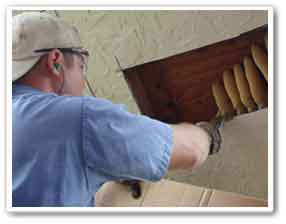
The removing of bees has
been done for years now. Bee removers
come highly respected. The job that we do is dangerous and needed in
many urban areas. Our company is the best at what it does. We make sure
to remove all the bees and
keep the area safe and clean after the removal
of the bees. The bees will be taken to a safe place.
If you would like to know how the bee remover is going to go about removing the bees, you are welcome to ask him questions before he starts the process. Once he has started it is best that you remain indoors because the behaviour of the bees, although predictable can change in a second and if you are not wearing the right gear or are unprepared for a swarm of bees attacking the consequences could be severe.
Bees settle in awkward places
Although we would prefer just to remove bees from tree branches or
hanging under a roof. But unfortunately bees enjoy their privacy as
much as we do and as such will find out of the way, difficult to reach
places to settle the colony. A good example would be this fibre glass
water feature. If you look at the first picture you will see how they
favour the shady inside of the feature. Of course there is access to
water, which is always a draw card when deciding on a place for a new
hive.
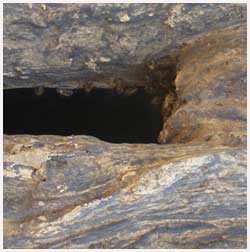
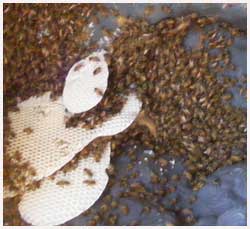 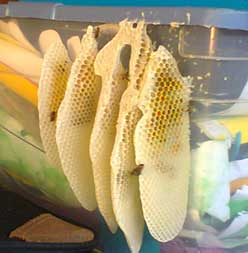
In the centre image you will be able to see that the bees have settled
and begun building a hive. Judging from the crisp look of the honey
comb and the lack of any colour dotting the honeycomb, which would indicate
the presence of honey or young bees, this is a fairly new settlement.
We managed to remove almost all the bees and their honeycomb, with
a minimum of disruption to the bees. They will be relocated to a place
where they will be able to build a new nest and continue about their
business peacefully.
A similar situation can be seen in the picture on the right, luggage
and storage containers were put outside and there was something about
this pile of items that attracted the bees and had them start building
their hive on the side of the storage container.
What happens to bees in Winter?
You may have noticed that the bees visiting your garden have become fewer as the winter has arrived and run its course, in fact they have all but disappeared in the las few weeks.
Though winters in South Africa are relatively mild there are a few weeks every year when the temperatures dip towards freezing point and below.
As soon as temperatures dip below 10 degrees Celsius bees stop flying, in fact they are unable to fly when the temperatures get too low. Instead they remain in the hive, surrounding the queen, keeping her and themselves warm through the vigorous vibration of their abdomens or the muscles attached to their wings. The bees in the cluster around the queen will rotate position in order for each bee to benefit from the heat that is generated.
Why do bees remain in the hive during winter
Aside from keeping warm and not being able to fly when the temperatures dip, bees remain in the hive, leaving only to take cleansing flights because there are no flowering plants from which to forage.
In the wild, bees will ensure that there is enough honey in the hive to get them through the cold season, but if the bees belong to a beekeeper he needs to ensure that he does not remove to much of the honey too close to winter or the bees will not have enough to keep them going. Feeding them with sugar water is an option to keep bees alive but it is a poor substitute for honey.
Last updated January 2015 |

 Most
people
Most
people 


